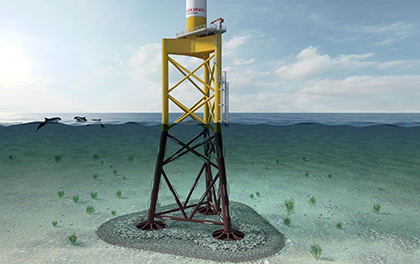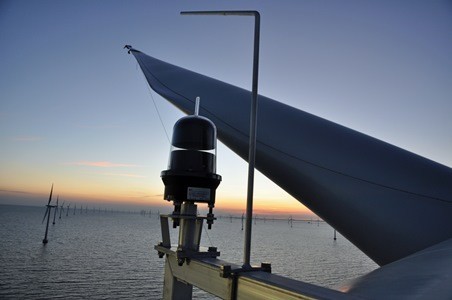Structural Health Monitoring
-
Monitoring the Suction Bucket Jacket at the Offshore Wind Farm Borkum Riffgrund 1 (Monitoring SBJ)The research project “Monitoring SBJ” is a joint project between DONG Energy, Leibniz Universität Hannover (LUH), and the Federal Institute for Materials Research and Testing (BAM). It is based on measured data gathered from the comprehensive monitoring system mounted on the recently installed Suction Bucket Jacket prototype foundation, located at the offshore wind farm Borkum Riffgrund 1. The tasks of ISD are the processing of measurement data from ambient vibration during installation and operation and the improvement of a numerical model in terms of the soil-structure-interaction.Led by: Prof. Dr.-Ing. habil. Raimund RolfesTeam:Year: 2014Funding: Federal Ministry for Economic Affairs and EnergyDuration: 01.08.2014 - 28.02.2017
![]()
![]()
Acoustics
-
Design, realisation and verification of low noise construction methods and noise reduction techniques during construction of offshore wind turbines (Schall 3)Goal of the project is the development and testing of practicable and efficient mitigation concepts to minimize the impact on the marine fauna during the construction of offshore wind turbines. It is planned to optimize the acoustic relevant parameters of the hydraulic pile driving process in numerical simulations as well as the optimization of pile sleeves and of different bubble curtain concepts.Led by: Prof. Dr.-Ing. habil. Raimund RolfesTeam:Year: 2007Funding: Federal Ministry for the Environment, Nature Conservation, Building and Nuclear Safety - FKZ 0327645Duration: 2007-2011
-
Research on and testing of noise mitigation measures during the construction of the FINO3-monopile (Schall FiNO3)The research project aims at the prototypic application of a big bubble curtain during the pile driving activities to install the FINO3-research platform in the German North Sea. It is planned to evaluate the efficiency of the mitigation concept to protect the marine environment against sound immissions during a short test program subsequent to the main piling procedure. In parallel, measures within the ecological accompanying research will be taken.Led by: Prof. Dr.-Ing. habil. Raimund RolfesTeam:Year: 2008Funding: Federal Ministry for the Environment, Nature Conservation, Building and Nuclear Safety - FKZ 0325023ADuration: 01.01.2008 - 31.03.2009
![]()
![]()
-
Investigation of Sonar Transponders for Offshore Wind Farms and Technical Integration to an Overall ConceptOffshore Wind Energy Converters require the installation and operation of sonar transponder units in order to achieve an acoustical warning of submarines. In order to assure a sufficient signal-to-noise ratio and a certain operation distance even under bad conditions the source level of the sonar transponder has to be high enough. On the other hand the bad influence on marine mammals has to be minimized. Beside the dimensioning of the transponders according to the requirements of the German navy an additional goal is the modeling of the sound propagation by means of a hybrid approach.Led by: Prof. Dr.-Ing. habil. Raimund RolfesTeam:Year: 2009Funding: Federal Ministry for the Environment, Nature Conservation, Building and Nuclear Safety - FKZ 0325104ADuration: 01.02.2009 - 31.03.2011
![]()
![]()
-
Realistic underwater noise scenarios on the basis of forecasting models and monitoring for the construction of offshore wind farms in the German North Sea (HyproWind)The research project aims at the development of a multi-stage numerical method for the prediction of underwater sound immissions related to pile driving in the German North Sea. The focus is not on the modeling of the source, but on an efficient calculation of the sound propagation for longer distances with a subsequent visualization in noise maps. Moreover, hydro-acoustic long-term measurements for model validation near the research platforms FINO1 and FINO3 are planned.Led by: Prof. Dr.-Ing. habil. Raimund RolfesTeam:Year: 2010Funding: Federal Ministry for the Environment, Nature Conservation, Building and Nuclear Safety - FKZ 0325212Duration: 01.09.2010 - 31.12.2013
![]()
![]()
-
Predicting Underwater Noise due to Offshore Pile Driving: Modeling of Noise Reduction Methods (BORA)The global target of the joint project BORA is to develop a calculation model to predict waterborne noise due to offshore pile driving. This includes especially models to predict the sound development at the source due to pile deformation and vibration, the sound transmission into water and soil and the consideration of the sound attenuation due to the air-water mixture produced by bubble curtains or due to other sound reduction methods.Led by: Prof. Dr.-Ing. habil. Raimund RolfesTeam:Year: 2012Funding: Federal Ministry for Economic Affairs and Energy - FKZ 0325421BDuration: 01.12.2009 - 30.11.2014
![]()
![]()
Coupled Dynamic Systems
-
Life time - Research on Support Structures in the Offshore Test Site alpha ventus (GIGAWIND life)Goal of the comprehensive project is the enhancement of the economic dimensioning concept for offshore wind turbine support structures, that has been developed in GIGAWIND alpha ventus, by consideration of long-time operation. There are both degradation mechanisms on the resistance side of the environmental surrounded support structure (damages of structure and welds, fatigue, damages of corrosion protection systems, scour, degradation of pile support behavior) and the determination of acting loads from waves and marine growth.Led by: Prof. Dr.-Ing. habil. Raimund RolfesTeam:Year: 1000Funding: Federal Ministry for Economic Affairs and Energy - FKZ 0325575ADuration: 01.02.2013 - 31.01.2018
![]()
![]()
-
Suction bucket foundations as an innovative and installation noise-reducing concept for offshore wind turbines (WindBucket)The overall goal of the research project „WindBucket“ is to assess the feasibility and possible applications and limitations as well as creating necessary conditions for planning, design and construction of bucket foundations of steel and reinforced concrete in German offshore fields. The tasks of ISD include the preparation of an integrated multi-physical model of the offshore wind turbine to study the dynamic behavior applying modal analysis and transient simulation under the consideration of soil-structure-interaction.Led by: Prof. Dr.-Ing. habil. Raimund RolfesTeam:Year: 2012Funding: Federal Ministry for Economic Affairs and Energy - FKZ 0325406BDuration: 01.07.2012 - 30.09.2014
![]()
![]()
-
Innovative Wind Conversion Systems (10-20 MW) for Offshore Applications (INNWIND.EU)The research project with a total of 27 European partners is an ambitious successor for the UpWind project, where the vision of a 20MW wind turbine was put forth with specific technology advances that are required to make it happen. The overall objectives of the INNWIND.EU project are the high performance innovative design of a beyond-state-of-the-art 10-20MW offshore wind turbine and hardware demonstrators of some of the critical components.Led by: Prof. Dr. Ing.-habil. Raimund RolfesTeam:Year: 2012Funding: European UnionDuration: 01.11.2012 - 31.10.2017
![]()
![]()
-
Probabilistic Safety Assessment of Offshore Wind Turbines (PSA)In diesem themenübergreifenden Verbundprojekt soll die für den Bemessungsprozess zentrale Frage der Versagenswahrscheinlichkeit in den aktuellen Bemessungen von OWEA geklärt werden. Hierfür werden mit Hilfe von probabilistischen Methoden Versagenswahrscheinlichkeiten für die Grenzzustände berechnet. Die vorhandenen Versagensarten der Tragstruktur werden in einer Fehlerbaumanalyse zusammengeführt und die wahrscheinlichste Versagensart sowie die resultierende Versagenswahrscheinlichkeit können bestimmt werden.Led by: Prof. Dr-Ing. habil. Raimund RolfesTeam:Year: 2014Funding: Ministry for Science and Culture in Lower SaxonyDuration: 01.12.2009-30.11.2014
![]()
![]()
-
Integrated Research Programme on Wind Energy (IRPWIND)The aim of the IRPWIND is to foster better integration of European wind energy research activities with the aim of accelerating the transition towards a low-carbon economy and maintain and increase European competitiveness. IRPWIND focusses on three main research aspects. The first one is the optimization of wind farms through the validation of integrated design models. The second one is the reduction of the uncertainty in order to increase efficiency and reliability of future wind turbines. The last one is the transformation of the energy supply system.Led by: Prof. Dr.-Ing. habil. Raimund RolfesTeam:Year: 2014Funding: European UnionDuration: 01.03.2014 - 30.04.2018
![]()
![]()




























